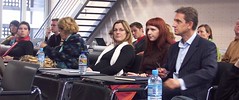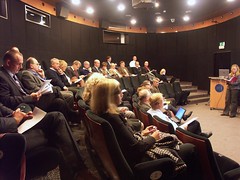
The
The Competitiveness Institute TCI ninth annual international convention on competitiveness, cluster initiatives and innovation system development is over. In in
Lyon this time.
A record number of participants were there. 437 attendees from 62 countries at the membership only sessions and 710 more at the open sessions. Five official foreign official delegations were there, and more than ten government officials showed up.
I noted a few things.
Countries that have not traditionally relied on domestic research and development, the Balkans and Pakistan, are now turning their economy to cluster development and innovation systems policy as a main driver for high-tech innovation.
I was very impressed by the speech by Omar Ayub Khan, Pakistan Minister of State for Finance. Listening to European politicians or industrial leaders is just ridiculous in comparison.
The traditional European politicians does not have a clue what all this innovation systems and cluster development are all about. But talk a lot, and I mean a lot, about how active they are in the field. But very few understand what they are doing or what they should do.
And they are in majority. Some statistics on the gender of the speakers at Clusters2006 in Lyon:
Opening daymales 92,0%
females 8,0%
Plenary
males 88,9%
females 11,1%
The only females in the figures were from France – Natural as the convent took place in Lyon and the majority of the speakers were from France – and from Slovenia. There were Elisabeth Waelbroeck-Rocha BIPE, Véronique Adnet, and Catherine Larrieu from France. And Marta Svetina, General-Director of Slovenian Technology Agency TIA, and Tea Petrin, former Minister of Finance and current Slovenian Ambassador in Holland.
These girls understand. None of the male European politicians got it right. None.
This is the core of the decreasing European competitiveness problem; Those in power dislike changes. And they happened to be Caucasian males 60+. From the old Europe.
















